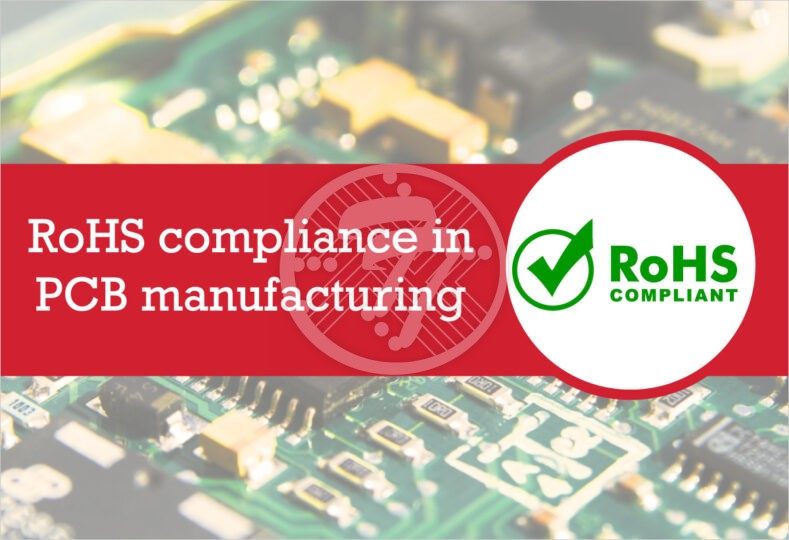RoHS Compliance in PCB Manufacturing: Top essential questions for your EMS provider!

As environmental regulations tighten globally, compliance with the Restriction of Hazardous Substances (RoHS) directive has become a cornerstone of sustainable electronics manufacturing. RoHS aims to limit the use of hazardous materials in electronic and electrical equipment, ensuring environmental safety and user health. If you are working with an Electronics Manufacturing Services (EMS) provider for PCB production, it is crucial to evaluate their RoHS compliance strategy.
Here are five critical questions to ask your EMS provider to ensure smooth, compliant, and efficient production.
1. What measures do you take to ensure RoHS Compliance?
Understanding your EMS provider’s compliance strategy is vital. Ask about their processes for sourcing RoHS-compliant components, managing supply chains, and adhering to updated regulations like RoHS 2 and RoHS 3. The latest standards, such as Directive 2015/863 (RoHS 3), restrict ten hazardous substances, including lead, mercury, cadmium, and four phthalates.
Ensure your provider employs robust tracking and reporting systems for materials and maintains detailed documentation for auditing purposes. Key tools, such as XRF analyzers for material testing, are essential for verifying compliance.
2. Are your suppliers verified for RoHS-Compliant Components?
The reliability of your EMS provider’s supply chain significantly impacts compliance. Non-compliant suppliers could result in recalls, fines, or brand damage. A reliable EMS provider collaborates only with certified suppliers who follow RoHS guidelines and conducts periodic audits to verify materials’ safety.
Request details about supplier selection criteria and how they avoid hazardous substances in raw materials. Proper sourcing practices prevent contamination and ensure full compliance.
3. How do you handle exemptions and updates to RoHS Directives?
Certain applications may qualify for exemptions under RoHS, such as medical devices or military electronics. However, managing exemptions requires expertise to ensure that they are valid, and that compliance is maintained elsewhere.
Additionally, the RoHS landscape evolves, with updates like RoHS 4 potentially on the horizon. A forward-thinking EMS provider will keep pace with these changes, proactively adapting processes and helping you plan for future compliance requirements.
4. What testing protocols do you follow for PCB products?
Testing is non-negotiable in RoHS-compliant PCB manufacturing. Ask about the specific methods your EMS provider uses to verify compliance. Portable X-ray fluorescence (XRF) analyzers are widely used to detect restricted metals in PCB components.
Moreover, inquire whether they perform batch testing or continuous monitoring and how often equipment is calibrated to ensure accuracy. Reliable testing prevents non-compliance issues that could arise post-manufacturing.
5. Do You Provide Full Documentation for RoHS Compliance?
Proper documentation is integral to RoHS compliance. Your EMS provider should furnish production records, including material sourcing, testing data, and compliance certifications. These records are crucial for audits, especially in regions requiring CE marking and detailed conformity assessments, like the European Union.
Ensure your provider retains records for the mandated 10-year period and offers easy access to documentation if needed for regulatory inspections.
Why RoHS compliance matters for PCB manufacturing?
Failing to meet RoHS standards can have severe consequences, including legal penalties, product recalls, and damage to your company’s reputation. More importantly, adherence to these standards reflects a commitment to environmental responsibility and customer safety. With the EU and other regions prioritizing stringent compliance checks, RoHS adherence is not just a regulatory box to tick – it is a competitive advantage.
Conclusion
When selecting an EMS provider for RoHS-compliant PCB manufacturing, don’t just focus on cost or production speed. Their commitment to regulatory compliance, ability to adapt to changes, and transparent practices are equally critical. Asking these five essential questions will help you identify a partner who ensures PCBs meet the highest standards of quality and environmental safety.
By integrating RoHS compliance into your manufacturing strategy, you can minimize risks, foster innovation, and ensure sustainable growth in the electronics industry.
Looking for reliable RoHS-compliant PCB manufacturing? At Technotronix, we specialize in delivering eco-friendly, high-quality PCBs tailored to meet your needs. Partner with us for unparalleled expertise, advanced technology, and a commitment to sustainability.
Contact us today at [email protected] to discuss your project and ensure compliance every step of the way!






